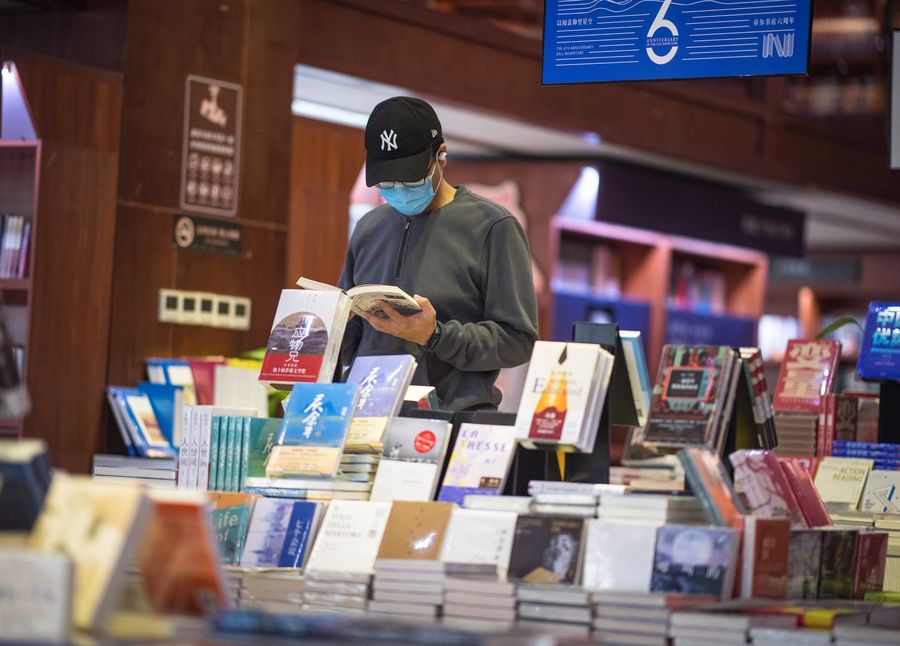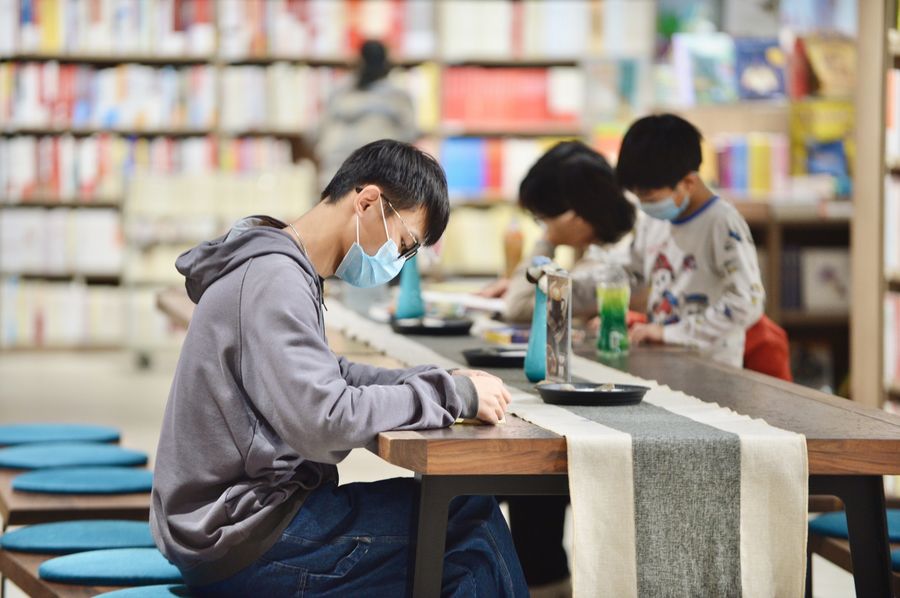
A citizen reads a book at Zall Bookstore in Wuhan, central China's Hubei Province, April 18, 2020. (Xinhua/Xiao Yijiu)
Epidemic literature has gained popularity. Sales of novels related to plague, virus and epidemiology have increased significantly over the past three months: survey
BEIJING, April 20 (Xinhua) -- Now that many Chinese people have to stay indoors to prevent COVID-19 infection, some have been seeking comfort and information from reading books.
Epidemic literature has gained popularity. Sales of novels related to plague, virus and epidemiology have increased significantly over the past three months, said a survey by Beijing-based book industry researcher OpenBook.
Among them, the Chinese-language editions of "Love in the Time of Cholera" authored by Nobel Prize winner Garcia Marquez, "The Plague" by French novelist Albert Camus, and "The Hot Zone" by American writer Richard Preston, have the fastest-growing sales.
Sales of "The Plague" and "The Hot Zone" have also hit a record high in the past two years, said Li Jingyi, assistant manager of OpenBook's consulting department.
Sci-fi writer Chen Qiufan, who reread "The Plague" at the beginning of the epidemic, said that readers could gain strength and learn lessons from the great plague described in the book, and then reflect on their lives.
"Plague is a way for nature to adjust its ecological balance. It will not disappear completely due to the progress of the human society and the development of technology, which therefore requires us to remain in awe of nature, have respect for science and protect humanity," Chen said.
Publishers have responded quickly to the rising demand for epidemic literature. The Shanghai Translation Publishing House, one of China's largest comprehensive translation publishers, has reprinted 50,000 copies of "The Plague" and "The Hot Zone," respectively.

People read books at Lijiang Bookstore in Nanning, capital of south China's Guangxi Zhuang Autonomous Region, March 15, 2020. (Xinhua/Cui Bowen)
Chinese writer Bi Shumin's novel "Corolla Virus," first published in 2012, has become a huge hit online since the start of this year, with its price soaring from a few dozen yuan to a few hundred yuan in the second-hand book market.
Bi was a former doctor. She was invited to write the novel in 2003 during the SARS outbreak. Writing the book in those days, Bi read many books about human evolution, the history of human plagues and disasters.
The writer believes that the COVID-19 epidemic is no accident. "Virus will repeatedly battle with humans. This is a disaster we can not escape," Bi said in a media interview in March.
Many readers are shocked by a city's lockdown and panic buying the writer described in the book. "I bought the book 12 years ago and read it again since January. I found the plot has a surprising resemblance to the situation over the past months," a web user posted on social media platform Weibo.
According to Li, even for many previously little-noticed science books, the sales have gone through the roof since the outbreak of COVID-19.
"The rising sales are partly because the national anti-virus fight still goes on, and social isolation gives people more time to read. Readers will naturally turn to the books related to epidemics for answers and comfort," Li said.
Textbooks, children's books and biographies also sell better than before, Li said.
The OpenBook survey shows that in the first quarter of 2020, affected by the epidemic, the overall Chinese book trade decreased by 15.9 percent year-on-year. The online bookstores saw sales up by 3 percent, while sales of the bricks-and-mortar bookstores went down by 54.8 percent.
Another recent survey by an industry watchdog shows that 926 of 1,021 surveyed bookstores have suspended business, accounting for 90.7 percent. High store rents, management expenses and salaries for employees have overwhelmed many small and medium-sized bookstores.
Earlier this week, TV host Bai Yansong, together with some publishers, initiated a campaign inviting a group of Chinese writers and cultural figures to launch online and offline reading activities with bookstores. The move aims to help them promote sales, as well as lead more housebound people to find the joy of reading.

Cartoonist Lin Dihuan donated 40,000 copies of his new comic book to Wuhan hospitals in February to cheer up medical workers and patients. (Photo provided to Xinhua)
Cartoonist Lin Dihuan is a supporter of the campaign. Active on social media with millions of followers, Lin has drawn a new comic book with dozens of cartoon pictures about people under quarantine. He donated 40,000 copies to Wuhan hospitals in February to cheer up medical workers and patients.
"I draw comics to help me ease my grief and to comfort readers. That is what I can contribute to the fight against the epidemic," said Lin. ■



